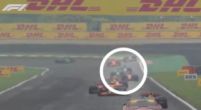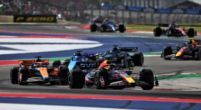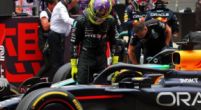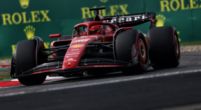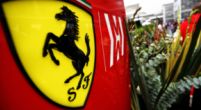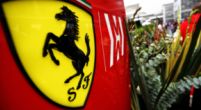Column
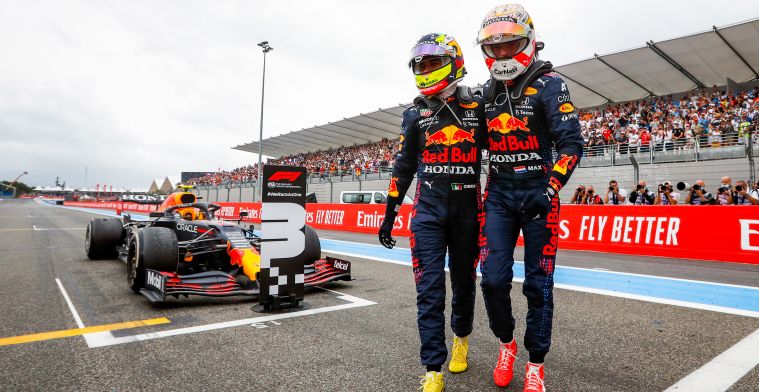
Column | Can Red Bull survive the season without engine penalties?
Penalties could be the deciding factor in this year’s championship. Following an incident-fraught British and Hungarian Grand Prix, it seemed that Red Bull’s Max Verstappen and Sergio Perez would have to take engine penalties later in the season. There is a glimmer of hope - with a shortened Belgian Grand Prix and the situation with the current calendar in jeopardy, the duo may not need to take grid penalties after all.
A Turn of Events
In the British Grand Prix, Max Verstappen was involved in a controversial incident with title rival Lewis Hamilton in which the Dutchman came off worst. In his column for RedBull.com, team boss Christian Horner stated that Verstappen’s heavy crash cost the team “1.8 million dollars”. Only one race later, Valterri Bottas made a significant error, outbraking himself and taking Lando Norris and Sergio Perez out of contention.
Following the Hungarian Grand Prix, Red Bull team principal Horner conceded to F1.com that there was “very little” hope that the team would avoid engine penalties after their string of crashes. Honda confirmed that both Verstappen and Perez had lost the second of the three engines in their allocation.
Not all is doom and gloom for the Milton Keynes outfit, however. Spa, with its ease of overtaking, would have been an ideal place to take engine penalties. Red Bull decided against it. It ended up being the correct decision, with Horner telling Sky F1 after the race, “I’m glad we didn’t take an engine penalty this weekend.”
Verstappen took pole in a dramatic, rain-soaked qualifying. Sunday’s weather conditions proved far too dangerous for racing, and Verstappen led three laps under safety car before the race was called off. The Dutchman took an easy win, securing 12.5 points for his championship bid. If he had taken his penalties at this race, he would have lost significant points to Hamilton. Equally as important, Verstappen’s third engine saw limited mileage amidst the shortened grand prix.
With the cancellation of the Japanese Grand Prix, Red Bull have ten races to stretch their current allocation of components. Concerns over the rise of the delta variant place the United States Grand Prix (and a second potential race at Circuit of the Americas) in serious jeopardy. The rumours suggest that Qatar is getting ready to host its first F1 Grand Prix, replacing the Australian Grand Prix.
The very best case is that Red Bull have eight Grand Prix to the end of the year. In that situation, Red Bull could realistically stretch their third power unit for six or seven more races and then revert to their oldest power unit for one of the less power-sensitive tracks.
However, if there are nine or ten Grand Prix remaining, it becomes far more difficult for Red Bull to avoid engine penalties. It might be possible to stretch the third engine for eight races, and use the oldest power unit for one or two races. This however certainly comes with a significant risk of failure. After a certain point, it is more beneficial to take fresh components and push to the maximum than it is to drive conservatively and risk a failure in one of the tightest championship battles in recent history.
Moreover, there is no guarantee that their rival Mercedes can make it to the end of the season without penalties. A single mechanical fault or reliability issue could drastically change the season.
Where Should Red Bull Take Their Penalties?
Of course, much of the championship battle depends on how the pandemic develops and how the calendar changes. If Red Bull need to take engine penalties (which seems the more likely outcome at the moment), they should do so strategically.
Ideally, they would take their penalties at one of Mercedes’ strong tracks. The alternative is that Red Bull take grid drops at one of their strong venues, in which case they lose out on a potential 1-2. Max Verstappen and Sergio Perez will surely have the pace to fight back to third and fourth place, minimizing their losses to their rivals.
Monza is a track with characteristics that will theoretically favour Mercedes. With its long straights and heavy braking zones, Monza is one of the easier tracks to overtake. However, past races have shown that DRS trains are prevalent at this circuit, and this may slow Red Bull’s progress through the field.
Other opportunities include Sochi and Yas Marina, both of which were Mercedes strongholds in past years. In the 2018 Russian Grand Prix, Max Verstappen scythed his way to fifth place in a matter of laps after starting last. However, it has been notoriously difficult to overtake at Sochi since the 2019 regulation change, and the same is true for Yas Marina.
The remaining tracks have characteristics that should favour the Red Bull RB16B. Therefore, the Italian Grand Prix remains Red Bull’s best bet to take their engine penalties and minimise their championship damages.





